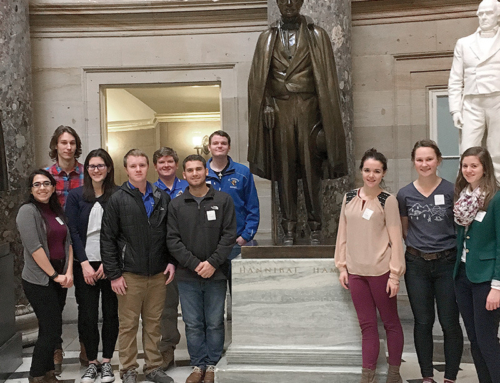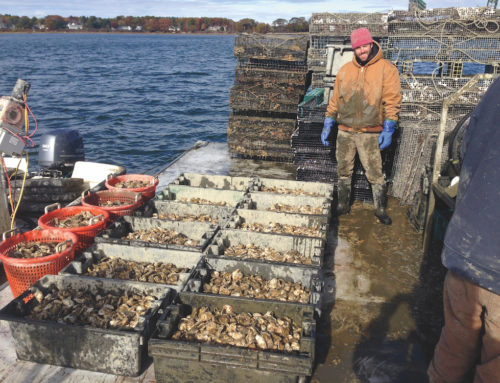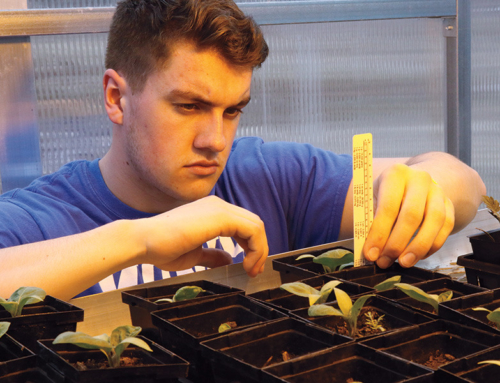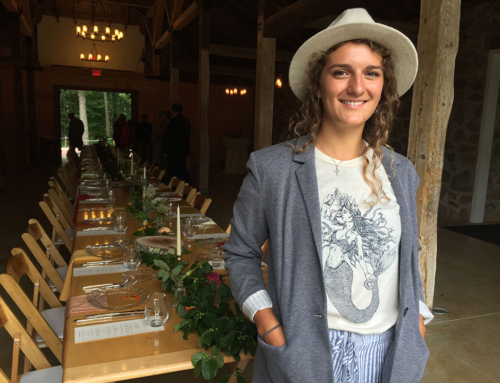High-Tech Job Opportunity on Campus
By Patricia Erikson
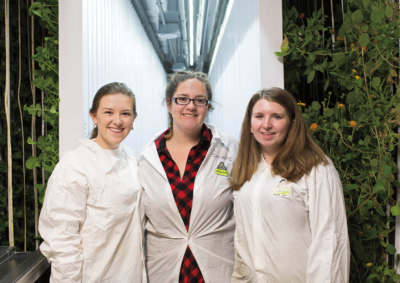
(L to R) Lily Lamkin ’20 (Standish, ME), Danielle Martin ’19 (Derry, NH), and Rebecca Barulli ’20 (Tyngsboro, MA) work in the hydroponic Freight Farm on campus, the first hydroponics facility of its kind in Maine. They transplant vegetables and flowers from seedling troughs to the vertical, hydroponic towers behind them and they harvest for consumption in Pearson’s Café. Photo: Kaitlynn Hutchins ’19.
Lily Lamkin ’20, Danielle Martin ’19, and Rebecca Barulli ’20 never thought that they would be seeding, transplanting, and harvesting vegetables between classes or around their homework, but that’s what they’re doing in the 320-square-foot shipping container on campus. Generously donated to the College by Hannaford Charitable Foundation, this self contained hydroponics facility inside the body of a freight truck is the first of its kind in Maine and part of the College’s Institute for Local Food Systems Innovation. Known as the Leafy Green Machine™, the climate controlled unit is built by Freight Farm, a Boston-based agriculture technology company. When Saint Joseph’s College Magazine sat down with three students who operate the Freight Farm, one thing became clear: all three were proud to operate a unique, high-tech growing system that is helping to feed their College community. And they love it.
Each student took a unique path that led to working in the Freight Farm—from being introduced to hydroponics in the Aquaculture class to volunteering with lead staff members to conducting a research project on aquaponics for the CASE Scholar program.* Each student was trained by Hilary Lamkin or Sue Wilson, staff members who have farmed the Leafy Green Machine™ on campus since day one. All three students see great value in introducing this sustainable food production initiative.
Lily (Nursing major and Business minor) said she sees the hydroponic growing system on campus as “a unique opportunity that many people do not get a chance to be a part of. As soon as I saw it, I knew I wanted to be a part of it. It allows me to help grow food for our community, which I find very fulfilling.”
Danielle (Marine Science major) said, “I’m interested in growing more sustainable food. I love growing the vegetables. My favorite part is to grow from the little seeds to huge lettuce heads. Most of them take and thrive. I like to see that.”
Rebecca (Marine Science and Environmental Science major with Sustainability minor) added, “I like being a part of the food system we’ve created here. I like the new up and coming high tech service of food. I see it in our future, especially urban areas.”
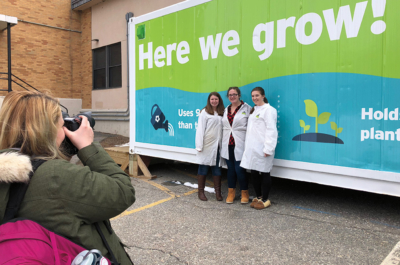
Kaitlynn Hutchins ’19 photographs fellow students outside of the Leafy Green Machine ™ manufactured by Freight Farm. Generously donated to the College by Hannaford Charitable Foundation, it’s the first of its kind in Maine. Photo: Patricia Erikson.
Danielle nods, “Hydroponic growing like this could be the future. Our soils are not supportive.”
All of them agree that few people know about the Freight Farm yet or understand how hydroponics works.
“I love seeing our lettuce served in the café every day.”
“It’s funny to say that I’m a farmer. I’m growing food, but not getting dirty. This gets me a foot in the door to a real life job,” said Rebecca.
Danielle laughed, “Yeah, if marine science doesn’t work out for me, this is another option. It’s a passion. I’m looking for summer internships now. I tell people, ‘I work at a Freight Farm’ and they say, ‘what’s that?’ So I explain that it’s a high-tech growing system that produces food more sustainably. There’s a lot of housekeeping to keep nutrient systems working properly. It all wouldn’t work if we didn’t calibrate the system.”
“The best thing about working in the Freight Farm is the people. I love who I work with and I love our shared passion for what we do. I still plan on becoming a nurse,” Lily said, “but life is a crazy thing; you never really know where you are going to end up. I am thankful for all of the knowledge and skills I have gained from working in the Freight Farm. I also love seeing our lettuce served in the café every day!”
“It’s relaxing working in there,” Danielle said. “Time passes without notice.”
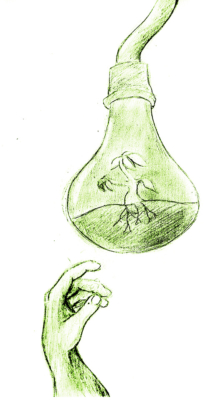
Illustration: Denver Bourgault ’21
“And the plants enjoy our music. It makes them grow better,” said Rebecca.
Lily, Rebecca, and Danielle have grown arugula, radishes, tomatoes, edible flowers, lettuce, and spring mix. After they harvest from the vertical towers, they carry what they’ve grown just a few steps into Mercy Hall and into the Pearson’s Café cooler.
The vertical hydroponics towers can grow a variety of plants, including: arugula, radishes, tomatoes, edible flowers, lettuce, and spring mix. A calibration system controls temperature, moisture, nutrient, and light systems inside the body of a freight truck.
*Each year, Saint Joseph’s College selects two Community and Sustainability Engaged (CASE) Scholars from the incoming freshmen class who have demonstrated a sustained commitment to environmental issues and community service during their high school years and are ready to commit to a progressively challenging, four-year study of and commitment to the emerging green economy.
